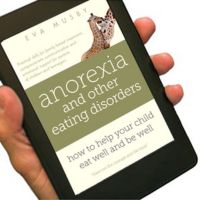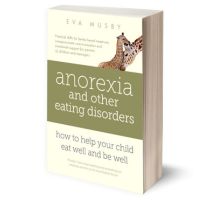Your cart is currently empty!

Where hospital treatment for eating disorders often fails us
Traditionally, hospitals have not put much focus on parents as a resource. When youngsters get discharged from 24/7 care in an inpatient unit, it’s very hard for them to handle the sudden transition home if they don't have skilled support from their parents . And how can the parents be skilled when they've hardly been involved in the hospital care? Sometimes parents may even be led to believe that they should take a step back. So you get a revolving door situation where the person needs re-admission.
The best treatment for a young person with an eating disorder is a family-based approach like Family-Based Treatment (FBT), and it's done by parents at home. When someone’s eating disorder is so severe that they need a spell in hospital, the parents should be getting the skills to take over with FBT as soon as their child returns home.
Here’s a mother’s experience of a hospital doing just that. I hope this guest post helps inspire parents and clinicians alike. It's about treating a child/adolescent, but as you'll see from comments below, it should also serve as inspiration for the treatment of 18+.
A mother’s review of ERC Denver
On the Around The Dinner Table forum, one of the mothers (pseudonym 'EternalHope') posted a review of ERC Behavioral Hospital for Children and Adolescents in Denver. ERC is a group of private Eating Disorder Recovery centres in the US.
I’ve asked EternalHope to tell us of her experience with ERC Denver, so that we can learn how the ethos of family-based treatment can work in hospital. Note that what she says is about the Denver ERC only, and it's about their adolescent unit, not their adult one.
"I really gained my confidence back during this time and presented to her every fear food I could think of, which she ate"
Over to you, EternalHope.
Parents: the best resource

ERC follows the most fundamental principle of family-based treatment – that parents are the best resource for their child’s recovery. The goal is to gradually turn over control to the parents.
ERC wants to get the patients out of treatment as soon as possible. They know that patients can get too comfortable in the routine and safety of Residential treatment. So as soon as possible, patients transition to the Partial Hospitalization Program (PHP, or day hospital), and only after that do they get to go home.
Mealtime coaching for parents begins toward the end of the Residential stay. Then in the Partial Hospitalization Program, parents start providing a meal on the unit (they have a working kitchen), then graduate to providing meals off unit, whether it be prepared by the parent, or at a restaurant. So every day at least one meal is provided by, plated, served and supervised by the parent, meanwhile getting support so that they can fully take over once the child is able to come home.
"Every day at least one meal is provided by, plated, served and supervised by the parent"
FBT at home didn’t work first time round
When my 11-year old daughter’s anorexia was first uncovered, we had weekly one-hour FBT therapy sessions. We had progress early on, but after 10 weeks, she needed a higher level of care. Initially she went inpatient for 5 weeks to a behavioural hospital in the midwest. During this time, she required an NG tube for nutritional support. The hospital did a good job and got her on the right path to recovery, but due to her age, she was not eligible for their residential program. They referred her to ERC in Denver.
One thousand miles

I was at first very resistant to this idea, as it separated our family by over 1,000 miles. It was difficult to wrap my brain around how all of this was going to work. Admitting my daughter to ERC Denver was the hardest, and yet the best decision we ever made. I truly believe they provided the best possible, and most evidence-based care to her while there.
Residential, then PHP
She was admitted to their Residential program (specialised eating disorder 24/7 care) and spent six weeks there. Their Adolescent Centre is one building that combines both Inpatient (focus on medical stability and weight restoration) and Residential patients. After being weight restored in Residential, she spent 3 ½ weeks in their PHP (that’s ‘Partial Hospitalization Program’ – a day-unit).
When your child enters the PHP program, you are required to live in the Denver area so you can bring them to and from the program. The program is very comprehensive – 7 days a week, 11 hours a day.
The population was around 15 – 20 patients during that time at Residential, and during her time in PHP, there were 6 – 10 other patients. It was a mix of patients, some who had been through other programs that were not successful, and were referred to ERC; others who were new to inpatient/residential treatment. 85- 90% of ERC’s population was from out of state.
ERC also offers an Independent model, if for example, the child is 17 and going off to college soon. One family had chosen this model while we were there. In the Independent model, the parents received the same training, and the patient was involved in understanding their individualized meal plan and the planning of their meals.
Staff with top expertise in eating disorders
ERC Denver is extremely thorough in the implementation of the individualized treatment plan. Their therapists, dietitians, and staff are very professional, compassionate and passionate about the work they do. Our therapist stayed late on a few occasions to talk to me about my daughter’s case. Because they focus exclusively on eating disorders, the staff (nursing, behavioural therapists, etc.) are all experienced and knowledgeable about the population.
This is in contrast to other mental hospital models where nurses may work on an adult drug unit one day, a depression unit another day, and an OCD unit another day.
A consistent message

The staff is consistent with message and protocols. The patients know exactly what the expectations are, and what the rewards/consequences will be if they are not compliant with the program or their meal plan.
Throughout a patient’s stay, during Inpatient, Residential and PHP, they maintain the same treatment team – the primary therapist, dietitian and psychiatrist. This is so important, as it takes time to build trust and relationships. This also maintains a continuity of care.
Each patient also has an individualized behaviour and meal plan.
Parents get mealtime skills, adolescents get to trust their parents

Toward the end of my daughter’s Residential stay, about a week prior to her transition to PHP, they had me join her for one meal a day at the Residential building, and coached me through eating with her and redirecting her eating-disorder table behaviours. They also had me portion her food in front of her.
"The staff coached me through eating with her and redirecting her eating-disorder table behaviours"
Once the PHP program starts, the parents bring food (there is a grocery store nearby), prepare it in the PHP kitchen, choose, portion and plate the food and supervise the meals. You serve it to your child in a supervised or non-supervised setting, depending on the need. So you are completely supported. My daughter had been a “super resistor.” When she left Inpatient from the other behavioural hospital, she said she would never eat anything I served her, and that she would never allow me to supervise her meals. But through the PHP program, she got used to having us take charge of her meals, which made all of the difference when we returned home.
As you continue to move through PHP, you receive passes for one meal a day off site. You can prepare the meal at home (in our case, at the Ronald McDonald house where we were staying) or you take them to a restaurant. You report back on how the meal went. Then you graduate to half days, then to a full weekend where you are feeding your child again. I really gained my confidence back during this time and presented to her every fear food I could think of, which she ate.
She was discharged five weeks ago. To date, we are still doing FBT at home. I choose, prepare, and plate the food, as well as supervise the meal. She has been 100% compliant with her meal plan, although meals are always a challenge. She still has table behaviours (tearing her food into small pieces), and I redirect those behaviours. She becomes angry and screams at me. I try to remain calm, consistent and compassionate. She finishes in the allotted time (30 minutes for meals, 15 for snacks) and has maintained her weight since leaving the program.
Blind weighing
ERC does not believe in patients knowing their weight (they say it's not helpful; focus should be on "numbers don't matter," as kids' weights constantly change due to growth), so blind weights are done. [Eva’s note: Chapter 6 of my book discusses blind versus open weighing and what the FBT manual says about it.]
Eating-disorder education for parents

During the week, you have 15 hours of classes/presentations, parent support groups and multi-family therapy. Multi-family therapy takes place twice a week, where families are in a room together to do group based projects. You learn a lot about how other families are coping with the illness. ERC provides you with a full binder/guide for the PHP program.
Classes cover the following topics:
- FBT (family-based treatment)
- Nutrition
- Relapse prevention
- DBT (dialectic behaviour therapy)
- CBT (cognitive behaviour therapy)
- Body image work
- Self-care for parents
Proper family therapy for eating disorders
You also have two family therapy sessions each week with your primary therapist, and these are truly rooted in the tenets of FBT. In doing my homework on treatment facilities, I found that on their websites a lot of other treatment centres talk about family being a source of healing, and they may offer a traditional form of family therapy, but it's not really FBT-based. (If you don’t know the difference and why it matters, check out Eva Musby’s page here.)
Family Days: a 3-day information program
Family Days is a 3 day series of presentations and talks ERC Denver runs once a month. They’re for the families of both adult and adolescent sufferers. We got presentations on brain development and what that means for our children. We were shown how to not accommodate the illness and how to avoid negotiating with it. We were taught about FBT and about a dietary plan. ERC does an outstanding job on the 3 days, and you have the opportunity to ask questions of top leadership, and you get to meet the head clinicians. The business manager also explains the insurance process.
Staying in Ronald McDonald House

While my daughter was in the PHP program we both lived at the Ronald McDonald House in Denver, along with half a dozen other ERC families. It was wonderful because it provided a kitchen, refrigerator and a safe environment. I also made several ERC parent friends while staying there, which provided a tremendous amount of support and understanding. It was a wonderful experience.
The Ronald McDonald House was clean, comfortable and $20 a day. ERC’s excellent relationship with Ronald McDonald House made it all easy.
The end of the program
When we left, we were provided with a comprehensive plan that would be provided to the next treatment provider, and a clear set of expectations was set up for my daughter. They did try give us contact information for new providers, but some of the information was outdated, and I had to research it on my own. They have been helpful post discharge in exchanging records with our new providers.
ERC staffers were very open about the fact that the road isn’t easy, and you will experience challenges post discharge. But I feel they have provided me with the tools to face those challenges. It has been challenging, but we’re hanging in there about five weeks after discharge.
Every parent I spoke with was very happy with the program and thankful for it. Many of us are still in contact.
Insurance
Their business office worked very well with us and our insurance. Any hiccups along the way, they immediately informed us of. They also kept up informed of the concurrent approval process and any peer-to-peer reviews. In the US, the approval process for services provided for mental health and physical health differs. For example, if you had a heart attack and required a 2-week hospitalization, you would stay the 2 weeks, and the insurance company would be billed by the hospital. On the mental health side, if you require a hospital stay (such as Inpatient, Residential or PHP), it has to be approved/pre-authorized concurrently during the stay. In our case, coverage was approved in small daily increments: 4 days at a time, 5 days, 7 days. So for example, we would be told, “coverage is approved through 9/15.) Then on 9/15, there would be another review between the insurance company and the ERC staff. We were denied coverage on a few occasions, and her ERC doctor did a peer to peer review with the insurance company’s psychiatrist. Fortunately we won those reviews, and never had to go through a full appeal process with the insurance company.
Back to Eva:
Thank you
Thank you for writing this, EternalHope. I hope this inspires clinicians to keep improving links between inpatient or day patient work and outpatient FBT services.
Anyone who has more good examples to contribute, do use the comment area below. And we appreciate that EternalHope's experience may not be yours.
A note on FBT and FT-AN and other names for similar treatments
Note that although we’re referring to FBT here, it’s just the same with any of the variations of ‘anorexia-nervosa-focused family therapy for children and young people (FT-AN)’ – the official terminology in England. More on the differences and similarities here.
More on hospitals and inpatient units
Chapter 12 of my book has a section on hospitals: you can read it all here. It includes a mother’s account of FBT principles being successfully used in Children’s Minnesota’s Center for the Treatment of Eating Disorders.
Chapter 12 also explains how there is currently a move towards paediatric wards giving youngsters brief treatment for their medical condition, while mental health services support parents and nursing staff to feed the child. The idea is to get a family-based approach in place right away and get the child home as soon as possible.
There's also this article: Adapting family-based treatment for adolescent anorexia nervosa across higher levels of patient care. Stuart B Murray, Leslie K Anderson, Roxanne Rockwell, Scott Griffiths, Daniel Le Grange, Walter H Kaye. Eating Disorders, 23:302-314, 2015
Some places have big improvements to make. See my YouTube video for the shocking story of the isolation practices used by a hospital in Switzerland, told by the parents of an 11-year old.
If you're hunting around for a treatment provider, you may find this section of FEAST useful: Parent reviews of treatment providers, It may also be worth joining an online parent group to ask around.
Also from me: How to choose treatment for your child with an eating disorder?
I also collate useful information on services in different countries.
And here I guide you towards certified FBT therapists worldwide who can treat by video call.
We’re squeaky-clean
Neither of us are getting any personal benefit from praising any institution (apart from the joy of knowing other families may get better help, faster).
Last updated on:
Comments
-
It's lovely to hear your dedication, Elizabeth Easton! I'll make sure EternalHope sees your message. Eva
-
EternalHope –
I can’t describe how much this warms my heart as I continue my work as the Senior Clinical Director at the Child & Adolescent Program at ERC Denver. I built the program, alongside an incredible team of colleagues, a little over 7 years ago. A major part of our mission was to empower caregivers, and that firmly remains as our mission today.
Thank you for taking the time to write this powerful description of your work with our team. And thank you for inspiring me and parents reading this…caregiver empowerment is possible in the face of this illness.
I hope continued success for your family.
-
I am a senior paediatric nurse in a paediatric unit in Adelaide, South Australia. We have an eating disorder program that we started in February 2013. We admit children and adolescents with eating disorders to our unit predominately with Anorexia Nervosa or ARFID.
Most patients are admitted medically unstable and require nasogastric re-feeding with cardiac monitoring initially with the expectation they will also eat a 1200kcal diet. As they stabilise they are moved to a level system where the N/G tube is removed and they are expected to eat a 2800kcal diet.
The parents/patient are given information on admission with a session with one of our paediatric ED team members about the strict program and the requirements of the family, restricted visiting to immediate family only initially (not grandparents). The parents have an education session with the dietitian and FBT therapist about the nutritional requirements their child will need once discharged and how to manage the behaviours that might occur once home.
The patients have their meals supervised by the paediatric nurse then start having the meals supervised by their parents out of the ward (the meal they would have eaten on the ward is taken to a courtyard etc).
This gives the parents practice with supervision and they get to see how much food is required for their child to recover. The patient also sees how it is for their parents to start the meal supervision. We encourage as many internal gate passes as possible.
They then move up a level and have a half day leave at home where the parent will supply the food and get their child to eat everything at home – meal and snack. If they won't eat everything they are returned to the ward for a bolus of nutritional drink to make up for the missed food. They then need to repeat the leave until it is successful.
When it is successful they then move up to the next level where they have an overnight leave with 2 full days at home. Once all leave has been successful and weight has increased the patient is discharged home with close medical and psychological follow-up.
The patients are usually discharged after 2-3 weeks. The readmission rate has reduced by 85% over the 4 years of the program.
The paediatric Eating disorder team meet twice weekly and the parents have a family meeting with the team weekly during the hospital admission. The nurses speak to the parents after hours when visiting to answer any queries they may have.
-
Sandy Bridgland, thank you SO MUCH for telling us about this… and for what your unit is doing.
Let's all publicise these good examples. Anyone wanting to link to Sandy's comment here, it is https://anorexiafamily.com/erc-denver-hospital-inpatient-residential-php-fbt/#comment-109872(Readers new to this, what Sandy Bridgland is describing is a brief paediatric admission that should allow many kids to go home for family-based treatment – and it reduces the need for the common situation where young people have to stay for much longer periods in a mental health unit or eating disorder unit. A paediatric ward has sick children and adolescents with all kinds of illnesses, and without the kind of initiative Sandy is describing, staff tend not to be comfortable with eating disorder treatment. For example they might bring a kid food but not realise it's important to monitor that the food is eaten. So this kind of shift in how treatment is done takes hard work… and clearly it pays off. I know of a few examples of this around the world and hope we can keep publicising them).
-
-
Hi Eva
Just to let you lnow that we in the Eden Unit provide FBT to all families wherever it is possible even though we are an inpatient unit and work with over 18s. As a team we feel it works well and the feedback from families has also been positive
Happy to tell you more if you are interested. Just thought you would like to know Scotland is not lagging behind – AND it is all on the NHS!
Dr E Jane B Morris
Consultant Psychiatrist, The Eden Unit
Royal Cornhill Hospital, Aberdeen-
Yes yes yes! And it's lovely to hear from you Jane.
Yes we need examples like yours, especially as you are doing this, not only as an inpatient unit but also treating 18+.
I'll be in touch – I'm keen to broadcast experiences of adult treatment using FBT so we can get more of it.
-
-
All this sound beautiful perfect but is NOT, my daughter spent like 7-8 months on ERC Denver – Pine amd evergreen- they contradict each other, they dont give is the right information and the worse of all they made promises – im wrttimg and verbal- that they will help my D and keep her there until she was cure, but at the end they trow her on the street because she was a complex case thay will damage their perfect image. the ONLY valuable recomendatio here is RonaldMcdonald House, the help and love we received there is a treasure in my heart. On family days ERC make everything lools so good that you almost faint of gratitud of having this opportunity but with time you will see the true colors of the place – money. money.money????
-
Thank you so much MBO for your account. I am not surprised that parents can have very different experiences and it is useful to hear people's experiences. I am so sorry — you must have gone through very tough times. I hope your daughter is on the recovery path now.
Am I correct in thinking your daughter was in an adult program of ERC Denver? If so, maybe this highlights how the treatment over adults could learn from the progress we're making in treating adolescents.
-




LEAVE A COMMENT (parents, use a nickname)